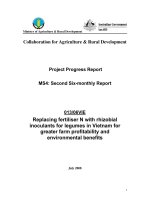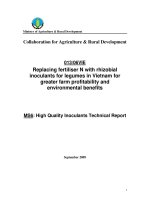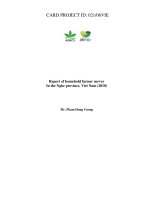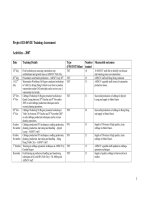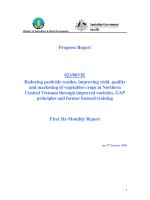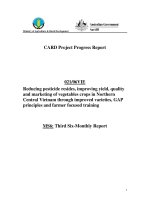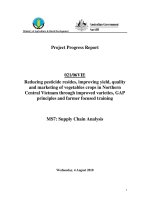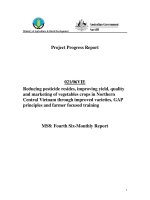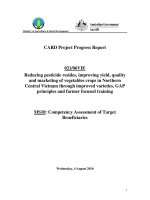Báo cáo khoa học nông nghiệp " Field evaluation and advanced vegetative mass-propagation technology for scaling up high-value plantations of Pinus caribaea and related hybrids in Vietnam - MS2 " pdf
Bạn đang xem bản rút gọn của tài liệu. Xem và tải ngay bản đầy đủ của tài liệu tại đây (51.5 KB, 8 trang )
Collaboration for Agriculture and Rural
Development
(CARD) Program
033/05VIE
Field evaluation and advanced vegetative mass-
propagation technology for scaling up high-value
plantations of Pinus caribaea and related hybrids
in Vietnam
MS2: First 6 monthly project Progress
report
February – August, 2006
Institute Information
Project Name
Field evaluation and advanced vegetative mass-propagation
technology for scaling up high-value plantations of Pinus
caribaea and related hybrids in Vietnam
Vietnamese Institution
RCFTI, Forest Science Institute of Vietnam (FSIV), MARD
Vietnamese Project Team
Leader
Dr Ha Huy Thinh
Australian Organisation
Forestry Plantations Queensland (Formally trading as DPI
Forestry)
Australian Personnel
Mr Ian Last
Date commenced
February 2006
Completion date (original)
February 2008
Completion date (revised)
February 2008
Reporting period
6 months to February 2007.
Contact Officer(s)
In Australia: Team Leader
Name:
Ian Last
Telephone:
+61 (0) 7 5482 0891
Position:
Manager, Forest Policy
Fax:
+61 (0) 7 5482 3430
Organisation
Forestry Plantations
Queensland
Email:
In Australia: Administrative contact
Name:
Ian Last
Telephone:
+61 (0) 7 5482 0891
Position:
Manager, Forest Policy
Fax:
+61 (0) 7 5482 3430
Organisation
Forestry Plantations Queensland
Email:
In Vietnam
Name:
Dr Ha Huy Thinh
Telephone:
Office: (84) 4
8389369
Mob: (84) 9120
60717
Position:
Director
Fax:
(84) 4 836 2280
Organisation
Research Centre for Forest Tree
Improvement, (RCFTI)
Email:
1. Project Abstract
The Project seeks to review existing experience with and performance of several tropical
conifer species in Vietnam, particularly Caribbean Pine, and to establish further
replicated trials of improved genetic material, including pine hybrids.
Additionally, the project will provide capacity building for several Vietnamese Forest
Research institutions relating to conifer tree improvement and mass propagation,
particularly via vegetative cuttings. Capacity building will be via hands on training in
both Queensland and Vietnam, development of small scale pilot hedge and containerised
nursery infrastructure, and a study tour to Australia involving innovative Vietnamese
forest managers / researchers.
Finally, the project will build awareness amongst both large and small forest growers
including ethnic minorities, through the establishment of collaborative demonstration
plantings in priority regions for conifer plantation expansion, supported by appropriate
training and promotional information
2. Executive Summary
Progress during the first 6 month reporting period has generally been in accordance with
the project Logframe. Highlights include the Inception meeting (Feb’06), Nursery
Training in Queensland (May’06), Australian Study Tour (Jun’06), planting of genetic
trials at 5 sites ( Jul’06) and preliminary review of existing trials to support development
of draft breeding strategy (Jul’06). Construction of the 3 pilot nurseries is progressing
well (due for completion Sept’06) in preparation for the first setting of cuttings (Oct’06).
The Australian project leader plans to visit Vietnam in November 2006 to review
progress against all objectives and discuss any emerging issues with Vietnamese partners.
3. Introduction & Background
Project objectives, outputs expected, approach and methodology can be summarised as
follows:
The Project seeks to review existing experience with and performance of several tropical
conifer species in Vietnam, particularly Caribbean Pine, and to establish further trials of
improved genetic material, including hybrids.
The project will also provide capacity building for Vietnamese Forest Research
institutions relating to Pinus tree improvement and mass propagation systems via training
in Queensland and Vietnam, development of small scale hedge and nursery infrastructure,
and a study tour to Australia, involving innovative Vietnamese forest managers /
researchers.
Finally, the project will build awareness amongst large and small-scale forest growers
including ethnic minorities, through the establishment of collaborative demonstration
plantings in priority regions for Pinus plantation expansion, supported by appropriate
training.
Key achievements during the reporting period include:
1. Successful Inception Meeting in Hanoi with Project partners (Feb’06)
2. Review of existing (Vn) nursery infrastructure completed (Feb’06)
3. Phase 1 nursery training (Queensland) completed (May’06)
4. Shipped materials for set up of pilot nurseries (3) to Vn (Jun’06)
5. Draft Nursery Manual prepared, discussed with trainees and translated into
Vietnamese
6. Successful study tour to Australia by leading Vietnamese forest researchers
(Jun’06)
7. Inspected (Vn) pine genetic trials and associated data sets from lead institutions
(Feb& Jul’06)
8. Seedlings raised for all genetic trials and 5 of 6 sites planted (Jul’06)
9. Plants raised for establishing hedges in pilot nurseries (Feb – July’06) and most site
works completed
Objective 1: Identify the most highly productive, well-adapted varieties and hybrids of
Pinus caribaea, in comparison to other pine species currently planted, for priority pine
planting zones.
Output 1.1: Review and report on comparative performance of pines in Vietnam
based on existing trials and related information.
Output 1.2: Establish genetic evaluation trials to compare performance of locally
available and introduced pines on multiple sites throughout key regions in Vietnam.
Output 1.3: Review pine genetic resources and related breeding strategies and
capabilities / resources in Vietnam, particularly for Pinus caribaea and related
hybrids.
Objective 2: Provide practical training and support to forest research institutes in
Vietnam to enable the development and local adaptation of hedge and containerised
nursery systems for the mass propagation of containerised pine cuttings
Output 2.1: Trained personnel able to establish and manage hedge beds, collect and
set shoots and raise containerised cuttings.
Output 2.2: Locally adapted Nursery Manual and related checklists developed
Output 2.3: 3 Pilot scale hedge and containerised nursery facilities established and
various prescriptions tested.
Objective 3: Create improved awareness amongst rural poor smallholders and industrial
forest growers in key pine growing regions, regarding the potential performance of
improved varieties of Caribbean pine to supply a range of forest products and services via
the establishment of demonstration plantings in collaboration with local land owners.
Output 3.1: Establish two demonstration trials with a large scale forest grower
Output 3.2: Establish community and individual farmer managed plantings in
collaboration with two local ethnic minority communities
The generalise approach and methodology being used to achieve these objectives and
outputs includes:
• Practical nursery training (in Queensland and Vietnam), supported by customised
procedural manuals
• Development of pilot nursery facilities to test and locally adapt new methods
• Study tours to expose Vietnamese researchers to novel approaches to forest
management;
• Review and analysis of existing tree improvement trials and strategies and the
development of revised approaches, supported by new field trials and
demonstration plantings
4. Progress to Date
4.1 Implementation Highlights
General
Successful Inception Meeting at Hanoi (15/2/06) attended by over 20 participants
Successful study tour to Australia by Vietnamese researchers (Jun’06)
Objective 1
Trial design agreed, seedlings raised and 5 of 6 genetic trials planted (Feb – Jul’06)
Initial inspection of various pine trials throughout Vietnam (Feb’06)
Review/ validation / analysis of available data on pine trials in Vietnam, discussions
with key researchers and preparation of draft review report (Jul – Aug ‘06)
Discussions on future breeding strategies between key Vietnamese and Queensland
researchers (Jul’06)
Objective 2
Inspected existing forest nurseries and proposed sites for (3) pilot nurseries (Feb’06)
Nursery training in Queensland completed (May’06)
Draft Nursery Manual prepared, discussed with trainees and translated. (May-
Jun’06)
Plants raised for nursery hedges now ready for planting.
Site work for the hedge areas completed for each of the (3) nurseries (Jun-Jul’06)
Nursery equipment (ex Australia) delivered to (3) nurseries in Vietnam (Jun’06)
Objective 3
Initial meeting with local minority people at Dak P’Lao, site of proposed
demonstration planting (Feb’06)
Detailed implementation progress is recorded in attached Progress Report Logframe
4.2 Capacity Building
See section 4.3 for details regarding Nursery Training
The June 2006 Australian Forestry Study Tour (4 + 4 participants) involved visits to
research institutions, several experimental trials, routine forest operations (several
plantation types) and several advanced forest products processing facilities, as well as
presentations by leading Australian forest researchers and managers.
Additional funding has been sourced to enable one of the key (female) Vietnamese
project staff to visit Queensland for 3 months (late August – late November 2006) to
support project outcomes. This will greatly enhance project communication and outputs
and individual and institutional capacity building for the relevant Vietnamese institution
(RCFTI).
4.3 Training Programs
Nursery training (4 participants) involved practical and theoretical training in cuttings
propagation techniques, health and hygiene practices, as well as other technical aspects of
nursery management. To reinforce learning outcomes, a
draft Nursery Manual has been
prepared (provided to participants) and translated into Vietnamese as a reference source
for other nursery managers. The draft Manual will be revised following scheduled
training in Vietnam, once partners have had more local experience with the new
techniques.
4.4 Publicity
There has been limited project publicity to date (eg mention in DPI Forestry Yearbook
and Calendar). This situation may change following completion of the pilot nurseries and
field establishment of the genetic trials.
4.5 Project Management
There have been no major issues relating to Project Management.
5. Report on Cross-Cutting Issues
5.1 Environment
There have been no major (negative) environmental issues associated with the Project
(and none are expected). Environmental aspects and impacts will be reviewed following
completion of the pilot nurseries and field establishment of the genetic trials.
5.2 Gender and Social Issues
The Nursery Training in Queensland was conducted by women and involved 50%
representation by women trainees. As mentioned under 4.2 above, additional funding has
been secured for a 3-month intensive training program for one of the key (female) project
staff to visit Queensland.
Discussions with small holders and ethnic minority groups regarding demonstration
plantings are only at a formative stage at this early phase in the project. Smallholder
involvement is planned as a year 2 output.
6. Implementation Issues
6.1 Issues and Constraints
To date, there have been no major issues or constraints affecting the overall planned
objectives and Outputs. Minor issues are addressed in further detail within the logframe.
Briefly these relate to:
Some shortcomings in available data associated with review of existing pine trials.
Incomplete germination of seed forwarded to partners resulted in minor
modifications to previously agreed design of genetics trials.
Delayed completion of pilot nursery and hedge facilities. Anticipated delays were
discussed at the May’06 Nursery Training Workshop where it was resolved to
commence pruning the hedge plants while they were still in pots to encourage
early shoot development prior to field planting in nursery beds. It is expected that
infrastructure for the pilot nurseries will be completed by September. This should
coincide with the first planned setting of cuttings.
6.2 Options
Options (actions taken) to address issues and constraints are covered in 6.1 above.
7. Conclusion
Overall, the project is progressing well with most planned activities either complete or
well-advanced. The Nursery Training Workshop and Study Tours to Queensland were
both highly successful and key genetic trials have recently been established. Information
has been gathered to inform the review of genetic trials and development of breeding
strategy options. Construction of pilot nurseries is well advanced and due for completion
in September. Hedge plants are developing well and should be field planted in the near
future.
The Australian Project leader plans to visit Vietnam in November to inspect recently
planted field trials and pilot nurseries and progress discussions regarding breeding
strategy development and demonstration plantings (large and small scale) planned for
Year 2 of the Project.
